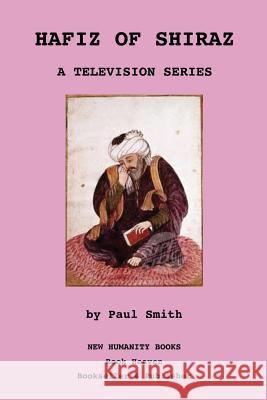Hafiz of Shiraz: A Television Series » książka
Hafiz of Shiraz: A Television Series
ISBN-13: 9781481161923 / Angielski / Miękka / 2012 / 330 str.
HAFIZ OF SHIRAZ: A television Series by Paul Smith This 40 part television series is based on Paul Smith's 3 volume 1900 page historical novel/biography on Hafiz's life from the age of eight in 1328 when his father dies and he goes to live with his Uncle Sadi, until after his death in 1392. Shiraz is under siege by the tyrant Mubariz and Hafiz's friend the king, Abu Ishak, is on the brink of madness and despair. Along the way Hafiz falls in love with his muse the beautiful Nabat, meets his Spiritual Master, marries and has a son. He teaches at University and befriends the liberated princess Jahan Khatun (Iran's greatest female poet) after being a student of the outrageous poet/jester Obeyd Zakani. He experiences kingdoms rise and fall, the people of his beloved city throwing out dictators, and the wrath of the false Sufi and black magician Shaikh Ali Kolah. After the bloodthirsty tyrant Mubariz takes control in Shiraz closing the winehouses, imprisoning Hafiz's friend the poet, Princess Jahan and forcing Obeyd Zakani to flee for his life. Abu Ishak is executed and the false Sufi Ali Kolah is now in control of religious morals. Eventually Mubariz's son Shah Shuja takes control but tragedy strikes Hafiz and Jahan, and Nabat must suffer separation. Kingdoms rise and fall through treachery and wars but through it all the songs/ghazals of Hafiz and his minstrel friends help the brave Shirazis to carry on until finally Hafiz gives his Master Attar an ultimatum after 40 years of devotion... God-Realization or else This is a majestic love story on a level of great love, beauty and consciousness, full of action and adventure, immortal poetry and song, bravery and betrayal and destiny. 40 hour long episodes. Paul Smith is a poet, author and translator of over 80 books of Sufi poets of the Persian, Arabic, Urdu, and other languages including Hafiz, Sadi, Nizami, Rumi, 'Attar, Sana'i, Jahan Khatun, Obeyd Zakani, Nesimi, Kabir, Anvari, Ansari, Jami, Khayyam, Rudaki, Yunus Emre, Lalla Ded, Mu'in Amir Khusrau and others, as well as poetry, fiction, plays, biographies, children's books and a dozen screenplays.
Zawartość książki może nie spełniać oczekiwań – reklamacje nie obejmują treści, która mogła nie być redakcyjnie ani merytorycznie opracowana.











